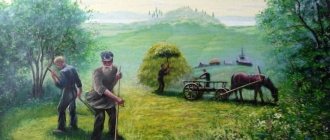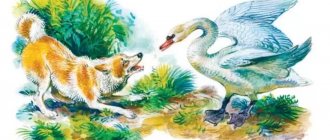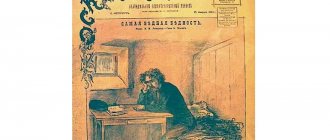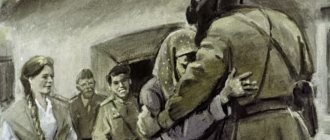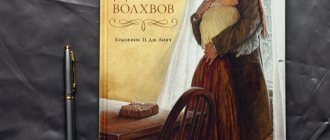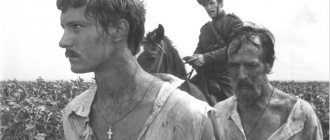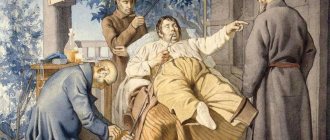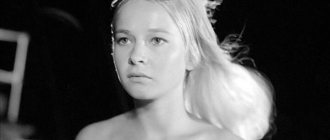Main characters of the story
Main characters:
- Mitya is a tall, thin young man experiencing all the pangs of first love.
- Katya is an attractive girl, a future actress, and the object of Mitya’s love.
Other characters:
- The director is an experienced tempter and Katya's lover.
- Olga Petrovna is Mitya’s mother, who is entirely busy with housework.
- The headman is Mitya’s tempter, who persuaded him to have fun with Alenka.
- Alenka is a young married woman, Mitya’s mistress.
Bunin "Mitya's Love" very briefly
I. A. Bunin “Mitya’s Love” summary for the reader’s diary:
Katya is the love of the main character Mitya. She is a future great actress. A girl with a strong and independent character who has her own opinion about everything that happens around her. She is ready to devote her entire life to art and her feelings. But Katya wants to accept payment for her love in order to give up her career for his sake.
But Mitya cannot offer her anything; he is very poor. She was haunted by the feeling that he loved her body and the image he created, and not her. After all, he didn’t even know how real she was. Katya is gradually becoming a young woman who is constantly working. She doesn't have time for relationships.
Mitya ennobles the girl with his love. But, passionately absorbed, Mitya does not know how to restrain his strong impulses of feelings and puts pressure on Katya with his unreasonable jealousy. Mitya, in order to somehow understand their love, goes far to the village, promising to write letters to her. In the village, he even began to look at other girls. But for a long time he does not succumb to carnal desire, thinking about love for Katya.
Over time, Katerina develops an uncertain relationship with her director. They have friendship at the same time, but with notes of love. This course of events hurts Mitya. He completely devoted himself to love for her, but she is primarily concerned with her career and she simply does not notice the suffering and trials of the guy’s feelings.
An unhappy lover spends less and less time with his beloved and worries about lost feelings. With each of her letters there is brevity and coldness, as well as hints at the end of the relationship. With her last letter, she confesses her feelings for the theater director and asks Mitya to forget her.
Mitya tries to find solace in love for an unfree lady, an unfaithful wife. The guy does not want this connection and resists the call of the body. He understands that this intrigue will not heal his old heart wound, but will only cause trouble. In addition, the guy is sure that he can break the heart of this indecent lady, and these experiences do not give him peace.
The craving for Alenka still wins, and he seeks a connection with her, unable to overcome himself. Disappointment in life comes instead of consolation. He is not satisfied with physical relationships, he needs real, spiritual ones. He constantly rereads Katya's old letter. He feels shame and anger at himself and those around him. Mitya could not cope with mental wounds. He decides to take a terrible step - to take his own life.
This is interesting: Bunin’s story “Sunstroke” was written in 1925, published a year later in Sovremennye Zapiski. On our website you can read a summary of “Sunstroke”, which will be useful both for your reading diary and in preparation for a literature lesson. The book describes a fleeting romance between a lieutenant and a young married lady who met while traveling on a ship.
A short retelling of “Mitya’s Love” by Bunin
Summary of “Mitya’s Love” by Bunin:
Katya, short, pretty and still very young, is Mitya’s beloved. She studies at a private theater school, goes to the studio of the Art Theater, lives with her mother, “an always smoking, always rouged lady with crimson hair,” who left her husband long ago. Mitya, a thin and awkward brunette with “Byzantine” eyes, often visits them, and Katya comes to his student rooms.
She and Katya had not yet crossed the last line of intimacy, although they allowed themselves too much in those hours when they were alone.
Mitya is completely absorbed in his feelings, unlike Katya, who is too immersed in the theatrical environment. Her hobby is indulged by the school director, “a smug actor with impassive and sad eyes,” who every summer goes on vacation with another student he has seduced.
During Lent, he begins to study with the girl individually. In the sixth week of Lent, the last before Passion, Katya, dressed all in white, like a bride, passes the exam to the director.
Mitya has long felt that Katya’s attitude towards him has changed. December, when they first met, seems easy and unforgettable to Mitya. In January and February, Mitya’s love was already poisoned by jealousy and mistrust. Now the exam seemed to “confirm all the correctness” of his torment.
The most terrible thing was the mixture of angelic purity and depravity that was in her, in her flushed face, in her white dress.
In the spring, important changes happen to Katya - she turns into a “young society lady”, constantly rushing to tailors and shopping. Her dates with Mitya are getting shorter and shorter.
At the end of April, Mitya decides to “give himself a rest and go to the village,” to a small estate run by his mother. Katya also believes that they need to temporarily separate and sort things out - she is tired of his jealousy, and she is not going to give up her theatrical career for Mitya’s sake.
At this time there is a final outburst of Katya's feelings. She spends a lot of time with Mitya, as his wife chooses things for him, accompanies him to the station on the day of departure and promises to write. They plan to meet in Crimea, where Katya and her mother are supposed to leave in early June.
Mitya’s younger brother and sister, high school students, have not yet arrived from Moscow, and the first days in the village pass quietly. Mitya is getting used to the old house again. In everything - in the surrounding nature, local girls, in the sweet spring air, he imagines Katya, her “secret presence”. Gradually, the real Katya turns into a girl created by his desire.
For the first time, Mitya lives in his home as an adult, “with his first true love in his soul.” Love captured Mitya “even in infancy” as something “inexpressible in human language.” He remembers himself in the garden, next to a young woman, probably a nanny. Then “something surged within him like a hot wave,” and then appeared either in the guise of a neighbor high school student or in the form of “sudden love at school balls.”
A year ago, when Mitya fell ill in the village, spring became “his first true love.” Immersion in March nature and manifestations of “pointless, ethereal love” accompanied Mitya until December of his first student winter, when he met Katya.
Mitya wanders around the small estate and remembers the death of his father nine years ago. Then he “suddenly felt: there was death in the world!”, and in the house for a long time there was a “terrible, vile, sweetish smell.” Mitya feels the same obsession now, only instead of a terrible death, his world is filled with Katya and love for her. Time passes, Mitya watches the reviving nature, which is decorated with his love.
Mitya constantly sends passionate letters to Katya and finally receives an answer with the words “my beloved, my only one.”
The cup of his love was full to the brim. And just as carefully, he carried it with him for the next few days, quietly, happily waiting for a new letter.
Time passes, the garden is dressed with fresh leaves, but there is still no letter from Katya. Mitya knows that it is difficult for Katya to get ready and sit down at her desk, but these considerations soon cease to help. Mitya spends almost all his time in the library, reading love poems in old magazines.
Gradually, Mitya is overcome by the feeling that “there will not be a letter and there cannot be, that something has happened in Moscow or is about to happen and that he is dead, missing.” At this time, pure sensuality begins to overwhelm him: lust at the sight of a “charwoman from the village” washing a window, in a conversation with a maid, in the garden, where the village girls flirt with the barchuk. Even the mother, always busy with housework, notices her son’s torment and advises him to go to the neighboring landowners, whose “house is full of brides.”
Mitya's torment is intensifying. He stops observing changes in nature and hardly sleeps at night. He feels ashamed to send the very busy and already middle-aged headman to the post office. He begins to ride off on horseback himself “to the village where there was a railway station and a post office,” each time returning with only a newspaper.
His torment reaches its limit. One day, returning through a neighboring, long-vacant estate, Mitya decides to shoot himself if there is no letter in a week.
It is at this moment of spiritual decline that the headman, for a small reward, invites Mitya to have some fun. At first, Mitya has the strength to refuse. Soon he forbids himself to go to the post office, cutting short these trips with “a desperate, extreme effort of will.” Mitya himself also stops writing, humiliatingly begging for love or at least friendship, and forces himself “not to expect anything.”
The headman again hints at “pleasure,” and Mitya, unexpectedly for himself, agrees. The headman offers him the forester’s daughter-in-law Alyonka - “a poisonous woman, young, with a husband in the mines... she’s only been married for two years.”
The next day Alyonka comes to work in the estate garden. Mitya finds in the short and agile woman something in common with Katya - “feminine, mixed with something childish.” A day later, the headman takes Mitya to the forester. While the headman and the forester are drinking, Mitya accidentally runs into Alyonka in the forest and, no longer able to control himself, agrees to meet tomorrow in a hut.
The whole next day he waits with terrible tension for the date. During lunch, a letter is delivered announcing the arrival of the younger children. Instead of being happy about his brother and sister, Mitya is afraid that they will interfere with the date. At night, Mitya sees himself “hanging over a huge, dimly lit abyss.”
In the evening, having accompanied his mother to the station, Mitya heads to the hut, where Alyonka soon appears. Mitya gives her the crumpled five-ruble note.
Everything was the same as before: the terrible power of bodily desire, which did not turn into spiritual desire, into bliss, into delight, into the languor of the whole being.
When what he wanted for so long happens, Mitya gets up “completely overwhelmed with disappointment” - the miracle did not happen.
On Saturday of the same week it rains all day. Mitya wanders around the garden in tears, re-reading the letter he received from Katya last night. She asks to forget her, bad, nasty, spoiled. She loves art madly, so she leaves “with you know who...”.
In the evening, a thunderstorm drives Mitya into the house. He climbs into his room through the window, locks himself from the inside and, overwhelmed by the heat, falls “into a lethargic stupor.” In a semi-conscious state, he sees the “young nanny” from his childhood carrying “a child with a big white face.”
The nanny suddenly turns out to be Katya, she hides the child in a dresser drawer. A gentleman in a tuxedo comes in - this is the director with whom Katya went to Crimea. Mitya sees Katya giving herself to him and comes to her senses with a feeling of piercing, unbearable pain.
Voices and laughter can be heard from the hall - the younger children are having dinner there. This laughter seems unnatural to Mitya “in its alienation from him, the rudeness of life, its indifference, mercilessness towards him.” There is no and cannot be a return to what was “like heaven.”
The mental pain becomes unbearable. “Passionately wanting only one thing - to get rid of her at least for a minute,” Mitya takes a revolver from the drawer of the night table and “sighing joyfully... with pleasure” shoots himself in the mouth.
Bunin wrote another story, “Cold Autumn,” in 1944. A summary of “Cold Autumn” for a reader’s diary will help you become familiar with the plot of the work and prepare for a literature lesson.
Analysis of the work “Mitya’s Love”
Initially, it should be noted that the story uses subtle psychologism.
Ivan Alekseevich was able to convey to the reader the internal state of the main character as clearly and humanized as possible, while using the parallelism of the human world and the surrounding space. The work used all sorts of pictures of nature, which were skillfully intertwined and accompanied by the love torments that the main character, Mitya, constantly experienced. The author paid special attention to the image of rain in the work. This element directly conveys the tragic experiences that Mitya had. In the story, there is a constant increase in rain at a time when the feelings of the main character began to intensify and become aggravated. As a result, at the end of the story the rain reaches its peak, as do the feelings of the main character, and a thunderstorm begins. Natural drama is very skillfully used by the author when conveying the internal state of the main character.
There are many artistic details “scattered” throughout the work, each of which is especially important. Among the surrounding world, the writer highlights a village garden, various types of flowers, and natural aromas inherent in this period of the year. The trill of the nightingale and the features of nature are closely interconnected with the feelings of the main character and with his difficult experiences. Throughout the story, Mitya is either jealous, or shows love, or waits for some changes, and in the end is disappointed in the companion he has chosen. Nature, which is spiritualized in the work, is presented as an indicator of special experiences and sensations.
Contents of “Mitya’s Love” by chapters
“Mitya’s Love” Bunin summary with a description of each chapter:
Chapters 1–7
Mitya is in love with Katya, a pretty young girl, a student at a private theater school. Mitya is terribly jealous of her representatives of the aristocratic bohemia, who pay special attention to the girl. Katya asks Mitya not to be jealous, and reminds that for her he is “still the best, the only one.”
Mitya constantly accompanies his beloved “to the studio of the Art Theater, to concerts, to literary evenings.” He just can’t get used to Katya’s mother, a woman with crimson hair who always smokes, wearing rouge.
After a while, Mitya begins to feel that “something has changed, something has begun to change in Katya.” He tries in every possible way to explain Katya’s inner inattention to him, but nothing helps, and the young man experiences painful jealousy.
Katya plunges headlong into theatrical life and shares her first successes - the director constantly praises her and predicts a brilliant future. It was known about this man that “he corrupted schoolgirls, every summer he took one with him to the Caucasus, Finland, and abroad.”
At the final exam, Katya, dressed in a white dress, causes a storm of applause. The first success makes her head spin, and she moves further and further away from Mitya. From a tender, touching, naive girl, she quickly turns “into some young society lady, dressed up and always in a hurry to get somewhere.”
Mitya decides to leave Moscow for a while to go to the family estate in order to get some rest from the jealousy that tormented him and Katya. They agree to meet in Crimea, where Katya is supposed to go with her mother at the beginning of summer.
Chapters 8–15
During the first days in the village, Mitya sleeps it off, comes to his senses, and gets used to his home again. But the change of place does not affect Mitya’s feelings in any way - he sees Katya’s image everywhere, feels her invisible presence next to him.
Mitya is looking forward to a letter from her lover - “Katya should have answered at least one of the letters that he sent her a long time ago.” When he receives the first news, he acutely feels that “the cup of his love was full to the brim.”
With the arrival of spring, nature transforms, fresh foliage appears on the trees, but there are no more letters from Katya. Mitya knows very well “Katya’s inability to write letters,” but this does not lessen her anxiety. He stops going for walks and spends almost all his time in the library, reading poems about love. Tired of waiting, Mitya no longer doubts that “there will be no letter and it cannot be, that something has happened in Moscow.”
Mitya’s mother, Olga Petrovna, advises her son to go on a visit and unwind. For example, the Meshchersky neighbors have a “house full of brides.” Mitya can hardly restrain himself - it’s difficult for him to hide his feelings, and he clenches his teeth “until his head hurts.”
Chapters 16–25
The torment of the unhappy lover is intensifying. He stops noticing changes in the world around him and hardly sleeps at night. Mitya begins to “go to the post office himself,” but each time he returns home only with a newspaper. He decides to shoot himself “if there is no letter in a week.”
With a “desperate, extreme effort of will,” Mitya forbids himself to go to the post office, write letters to Katya with assurances of love, humiliate himself, and beg for friendship.
Seeing Mitya’s suffering, the headman invites him to have fun on the side. For a small fee, Alenka can spend time with him - “a poisonous woman, young, husband in the mines.” The headman cleverly organizes Mitya a date with Alenka in the forest.
Chapters 26–27
In terrible tension, Mitya waits to meet the girl. Having learned that his younger brother and sister will soon arrive, he begins to worry that the children will disrupt his plans. The night passes anxiously, and in a dream Mitya sees himself “hanging over a huge, dimly lit abyss.”
The whole next day drags on endlessly, but the closer the evening gets, the more nervous tremors seize Mitya. He goes to the forest, to the hut, where a meeting has been arranged. Soon Alenka appears, and the first thing Mitya does is shove a crumpled five-ruble note into her “palm.” He is lost and doesn't know how to behave. After the long-awaited intimacy, Mitya feels disappointed - he expected completely different emotions and experiences.
Chapters 28–29
It's been raining like crazy all Saturday. Mitya wanders around the garden all day and cries bitterly, marveling at “the strength and abundance of her tears.” “All wet through, without a single spot of blood on his face, with tear-stained, crazy eyes,” he rereads Katya’s letter, in which she asks him to forget her - bad, disgusting, spoiled. She admits that she is madly in love with art and leaves with the director. There’s no point in writing to her anymore – “it’s useless.”
A raging thunderstorm drives Mitya into the house. He climbs into his room through the window and locks himself from the inside. He begins to develop a fever, and in his delirium he sees Katya in the director’s arms.
The “voices and laughter” of younger children can be heard from the next room. Mitya understands that there is no way to “save his beautiful love” and quietly cries from the pain tearing him apart. Desperately wanting to “get rid of her at least for a minute,” Mitya takes out a revolver and, “sighing deeply and joyfully,” shoots himself forcefully in the mouth.
This is interesting: Bunin’s story “Clean Monday” was written in 1944 and was included in the author’s collection dedicated to the theme of love “Dark Alleys”. You can read a summary of “Clean Monday” on our website. The work belongs to the literary movement of neorealism.
Summary
Chapters 1-7
Mitya is in love with Katya, a pretty young girl, a student at a private theater school. Mitya is terribly jealous of her representatives of the aristocratic bohemia, who pay special attention to the girl. Katya asks Mitya not to be jealous, and reminds that for her he is “still the best, the only one.”
Mitya constantly accompanies his beloved “to the studio of the Art Theater, to concerts, to literary evenings.” He just can’t get used to Katya’s mother, a woman with crimson hair who always smokes, wearing rouge.
After a while, Mitya begins to feel that “something has changed, something has begun to change in Katya.” He tries in every possible way to explain Katya’s inner inattention to him, but nothing helps, and the young man experiences painful jealousy.
Katya plunges headlong into theatrical life and shares her first successes - the director constantly praises her and predicts a brilliant future. It was known about this man that “he corrupted schoolgirls, every summer he took one with him to the Caucasus, Finland, and abroad.”
At the final exam, Katya, dressed in a white dress, causes a storm of applause. The first success makes her head spin, and she moves further and further away from Mitya. From a tender, touching, naive girl, she quickly turns “into some young society lady, dressed up and always in a hurry to get somewhere.”
Mitya decides to leave Moscow for a while to go to the family estate in order to get some rest from the jealousy that tormented him and Katya. They agree to meet in Crimea, where Katya is supposed to go with her mother at the beginning of summer.
Chapters 8-15
During the first days in the village, Mitya sleeps it off, comes to his senses, and gets used to his home again. But the change of place does not affect Mitya’s feelings in any way - he sees Katya’s image everywhere, feels her invisible presence next to him.
Mitya is looking forward to a letter from her lover - “Katya should have answered at least one of the letters that he sent her a long time ago.” When he receives the first news, he acutely feels that “the cup of his love was full to the brim.”
With the arrival of spring, nature transforms, fresh foliage appears on the trees, but there are no more letters from Katya. Mitya knows very well “Katya’s inability to write letters,” but this does not lessen her anxiety. He stops going for walks and spends almost all his time in the library, reading poems about love. Tired of waiting, Mitya no longer doubts that “there will be no letter and it cannot be, that something has happened in Moscow.”
Mitya’s mother, Olga Petrovna, advises her son to go on a visit and unwind. For example, the Meshchersky neighbors have a “house full of brides.” Mitya can hardly restrain himself - it’s difficult for him to hide his feelings, and he clenches his teeth “until his head hurts.”
Chapters 16-25
The torment of the unhappy lover is intensifying. He stops noticing changes in the world around him and hardly sleeps at night. Mitya begins to “go to the post office himself,” but each time he returns home only with a newspaper. He decides to shoot himself “if there is no letter in a week.”
With a “desperate, extreme effort of will,” Mitya forbids himself to go to the post office, write letters to Katya with assurances of love, humiliate himself, and beg for friendship.
Seeing Mitya’s suffering, the headman invites him to have fun on the side. For a small fee, Alenka can spend time with him - “a poisonous woman, young, husband in the mines.” The headman cleverly organizes Mitya a date with Alenka in the forest.
Chapters 26-27
In terrible tension, Mitya waits to meet the girl. Having learned that his younger brother and sister will soon arrive, he begins to worry that the children will disrupt his plans. The night passes anxiously, and in a dream Mitya sees himself “hanging over a huge, dimly lit abyss.”
The whole next day drags on endlessly, but the closer the evening gets, the more nervous tremors seize Mitya. He goes to the forest, to the hut, where a meeting has been arranged. Soon Alenka appears, and the first thing Mitya does is shove a crumpled five-ruble note into her “palm.” He is lost and doesn't know how to behave. After the long-awaited intimacy, Mitya feels disappointed - he expected completely different emotions and experiences.
Chapters 28-29
It's been raining like crazy all Saturday. Mitya wanders around the garden all day and cries bitterly, marveling at “the strength and abundance of her tears.” “All wet through, without a single spot of blood on his face, with tear-stained, crazy eyes,” he rereads Katya’s letter, in which she asks him to forget her - bad, disgusting, spoiled. She admits that she is madly in love with art and leaves with the director. There’s no point in writing to her anymore – “it’s useless.”
A raging thunderstorm drives Mitya into the house. He climbs into his room through the window and locks himself from the inside. He begins to develop a fever, and in his delirium he sees Katya in the director’s arms.
The “voices and laughter” of younger children can be heard from the next room. Mitya understands that there is no way to “save his beautiful love” and quietly cries from the pain tearing him apart. Desperately wanting to “get rid of her at least for a minute,” Mitya takes out a revolver and, “sighing deeply and joyfully,” shoots himself forcefully in the mouth.
Video summary of Mitina love Bunin
The theme of unrequited youthful love is revealed by Bunin as fully as possible, psychologically subtly. The author sympathizes with the young man who had to face a lie that devastated his soul and left no hope for a happy life.
Summary of Bunin “Mitya’s Love” on video:
This is interesting: The fairy tale “The Kingdom of Crooked Mirrors” by Gubarev was written in 1951. For a reading diary and preparation for a literature lesson, we recommend reading the summary of “The Kingdom of Crooked Mirrors” chapter by chapter on our website. The plot centers on the fascinating adventures of a simple Soviet schoolgirl Olya in a magical land. After going through many tests, she realized that she needed to change her character for the better.
Popular retellings today
- A fairy tale about how the last Fly lived - a summary of Mother-Sibiryak
The newborn Fly joined the swarm of flies flying from the garden to the rooms. Together with her friends, she enjoyed life, and it seemed to her that the world was arranged in such a way that it was convenient for flies to live in it. - Strange people - a summary of Shukshin's story
This work consists of three stories that tell about very sincere and hypersensitive people. These people live only in villages. It is noteworthy that people with such character - Summary of the book Unexpectedly by Rasputin
The work is about Sen Pozdnyakov. This is a respectable, honest person who is distinguished by compassion, kindness, and a sensitive disposition. The author also gives his wife exclusively - The Tale of Ersha Ershovich, son of Shchetinnikov - a summary of the fairy tale
“The Tale of Ersha Ershovich, son of Shchetinnikov” begins with a description of the trial taking place on the land of Rostov. Ruff is judged by the boyar Sturgeon and also by the Catfish-voivode of the Khvalynsky Sea, pike perch and Trepetukha Pike.

